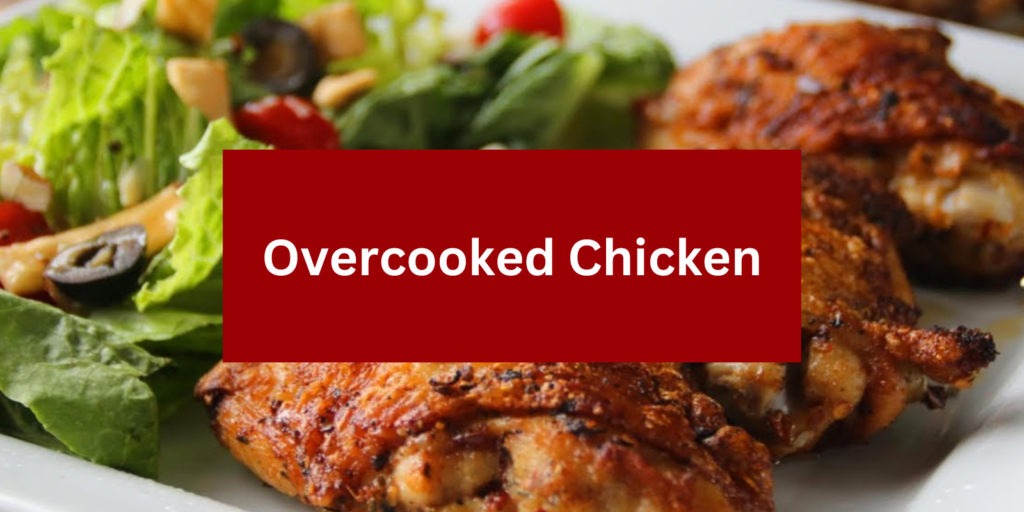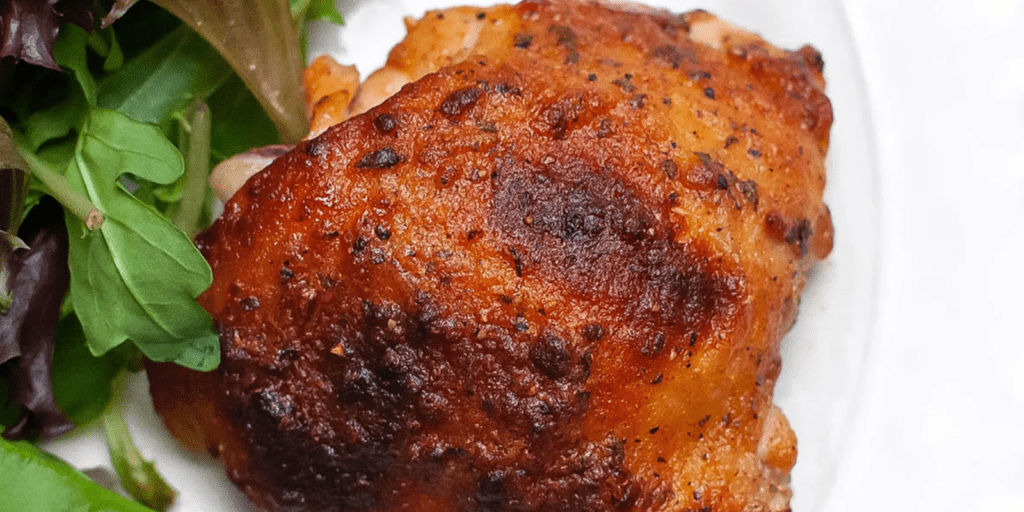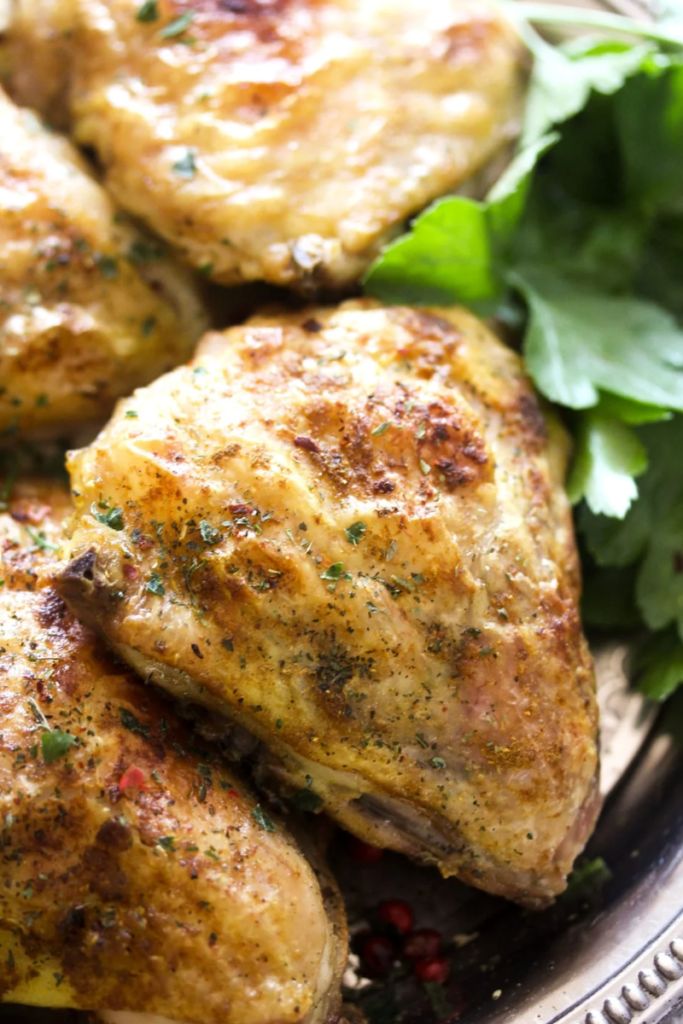When cooking chicken, achieving the perfect level of doneness is crucial for safety and taste. But what happens if you accidentally overcook your chicken?
Is it still safe to eat, or should you discard it?
The good news is that overcooked chicken is generally safe to eat.
Overcooked chicken can be safe to eat but may lack flavor and moisture. Ensure it reaches a minimum internal temp of 165°F for safety.
Because cooking chicken thoroughly is essential to eliminate harmful bacteria like salmonella and ensure it’s safe for consumption. So, overcooking chicken won’t make it unsafe regarding food safety.
Let’s check into overcooked chicken to understand whether it’s safe and what you can do if it happens.
What You Can Do If Overcooked a Chicken?
If you’ve accidentally overcooked chicken, there are still a few steps you can take to salvage the dish and make it more palatable:

Texture and Flavor
Overcooking chicken can have negative consequences in terms of texture and flavor. When chicken is overcooked, it tends to become dry, tough, and less flavorful.
The prolonged cooking process can prevent the meat from losing moisture, resulting in a less juicy and enjoyable dining experience.
Avoiding Overcooking
To prevent overcooking, using a meat thermometer when cooking chicken is essential.
The recommended internal temperature for chicken is 165°F (74°C). Once the chicken reaches this temperature, it’s safe to eat, and you can avoid the risk of overcooking.
Resting Period
Another essential aspect of cooking chicken to perfection is allowing it to rest after cooking.
This resting period allows the juices to redistribute within the meat, ensuring a juicier and more tender result.
Salvaging Overcooked Chicken
If you’ve overcooked your chicken and it has become dry, there are still ways to salvage it.
Slicing or shredding the overcooked chicken and using it in dishes with sauces or gravies. The added moisture from the sauce can help improve the texture and taste.
Can Overcooked Chicken Make You Sick?
Cooking chicken to the right degree of doneness is crucial for safety and flavor. But what happens if you accidentally overcook your chicken? Can it make you sick?
The good news is that overcooked chicken, in and of itself, is not a direct cause of foodborne illness.
Cooking chicken thoroughly is essential to kill harmful bacteria like salmonella and ensure it’s safe for consumption. So, if you’ve overcooked your chicken, it should still be safe to eat from a food safety perspective.

However, the primary issue with overcooked chicken is not related to food safety but to its texture and taste.
When cooked well beyond the recommended internal temperature, chicken tends to become dry, tough, and less appealing.
What are the Bad Effects of Eating Overcooked Food?
Eating overcooked food can have several undesirable effects on the quality and enjoyment of a meal. One of the most noticeable consequences is the loss of texture and flavor.
Overcooking can turn meats, vegetables, and grains dry and tough, making them far less appetizing. The experience of eating overcooked food can be a far cry from the delicious, tender, and flavorful dishes we expect.

Beyond the sensory aspects, overcooking can also compromise the nutritional value of a meal. Heat can break down essential nutrients like vitamins and minerals, potentially reducing the health benefits of our food.
So, in addition to affecting taste, overcooked food may offer fewer nutritional advantages.
In some cases, overcooking can be more than just a culinary disappointment. Harmful compounds like heterocyclic amines (HCAs) and polycyclic aromatic hydrocarbons (PAHs) can form when charred or burned meats.
These compounds have been linked to an increased cancer risk, emphasizing the importance of not letting food become excessively charred.
Moreover, moisture loss in overcooked dishes, particularly in proteins like chicken or pork, can further detract from the meal’s appeal.
Dry and bland food is far from enjoyable, and overcooking can lead to a significant waste of ingredients, not to mention the time and energy invested in preparing the dish.
Lastly, while overcooking itself doesn’t cause foodborne illness, it’s essential to maintain proper cooking temperatures for safety. Overcooking to the point of charring or burning may not necessarily kill harmful bacteria if the internal temperature doesn’t reach the recommended levels.
Therefore, it’s crucial to balance ensuring food safety and preparing safe and enjoyable dishes.
Is it OK to Eat Overcooked Food?
Ng overcooked food is generally safe from a food safety perspective. However, it can negatively affect the quality and healthiness of the meal.

Heat accelerates chemical reactions in food, impacting it in beneficial and detrimental ways.
1. Impact on Digestion and Metabolism
Overcooking can affect food quality, making it harder for the body to digest and metabolize.
When food is overcooked, it can become tougher and less palatable, potentially leading to digestive discomfort.
2. Formation of Carcinogenic Substances
Another concern with overcooking is the potential formation of carcinogenic substances. Charred or burned foods can produce compounds like heterocyclic amines (HCAs) and polycyclic aromatic hydrocarbons (PAHs). These compounds have been linked to an increased risk of cancer.
While overcooked food may not pose immediate health risks, it’s essential to maintain proper cooking techniques to ensure the best taste, texture, and nutritional value.
Avoiding overcooking preserves the quality of your meals and minimizes potential health concerns associated with charred or burnt foods.
More Asking FAQs
Can you do anything with overcooked chicken?
One of the best strategies is incorporating it into a recipe with a rich and flavorful sauce, such as a pasta dish.
To salvage dry chicken, dice or shred it and add it to your chosen pasta creation. The sauce and other ingredients in the dish will help rehydrate the chicken and infuse it with flavors, making it much more enjoyable to eat. It’s a clever way to turn a cooking mishap into a culinary success, ensuring that your overcooked chicken doesn’t go to waste and becomes a tasty part of a new and satisfying meal.
Should you overcook chicken?
No, you should not overcook chicken. Overcooking chicken breasts can lead to dry, tough, and less flavorful results. To ensure a delicious and tender chicken breast, it’s best to cook it for the shortest time necessary to reach the safe internal temperature of 165°F (74°C). This way, you can enjoy a juicy and flavorful chicken meal.
Is overcooked meat still nutritious?
Overcooked meat and vegetables may lose some of their beneficial nutrients. While we often focus on the potential dangers of undercooked or raw food, it’s important to be aware that overcooking can also adversely affect certain foods’ nutritional content. Therefore, it’s advisable to find a balance in cooking methods that preserve food safety and the valuable nutrients in our meals.
Does overcooked chicken taste good?
Overcooked chicken may be safe, but it won’t provide an enjoyable culinary experience. The taste and texture of overcooked chicken are typically less pleasant, as it can become dry and tough. While it may not pose health risks like undercooked or raw chicken, the loss of flavor and tenderness is a significant drawback when chicken is overcooked.
Ending Lines
In conclusion, overcooked chicken is safe from a food safety perspective. However, it may be less enjoyable due to its dry and tough texture. To avoid overcooking, use a meat thermometer and allow your chicken to rest after cooking.
If you end up with overcooked chicken, consider using it in recipes where the texture can be improved by adding sauces or gravies. This way, you can still maximize your meal and minimize food waste.
